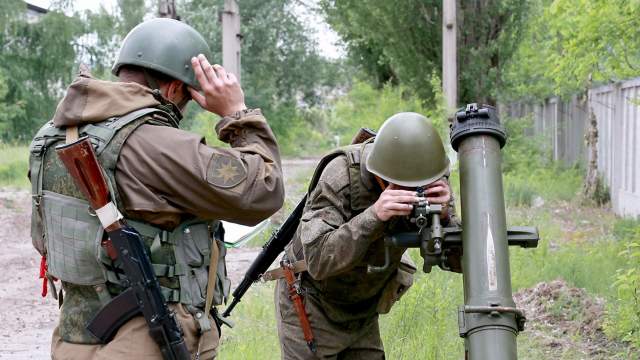Izvestia visited the contact line and talked with the LPR fighters
The troops of the Luhansk People's Republic with the fire support of the Russian Armed Forces, continuing the offensive, entered the residential quarters of Severodonetsk. The encirclement ring around the Lisichansk-Severodonetsk agglomeration should close soon. Izvestia visited the LPR units operating on the contact line with the enemy. About what an intermediate sanitary post is, how the fighting is going on in the forests, how mortar strikes are being carried out, what the soldiers are fed and what the "fart dugout" saved them from — in the Izvestia report.
Alarm clock for 6:00
— Here we have an alarm clock, — the LPR fighters tell the correspondents of Izvestia. — At exactly six in the morning, a "bird" — a Ukrainian reconnaissance quadcopter - arrives at our positions.
When approaching, the car gives out a characteristic buzzing. In the forest where the positions are located, this sound is almost inaudible, but the fighters have learned to recognize it. Then the "bird" freezes, and silence ensues. But the soldiers are no longer sleeping — a new day has begun at the front.
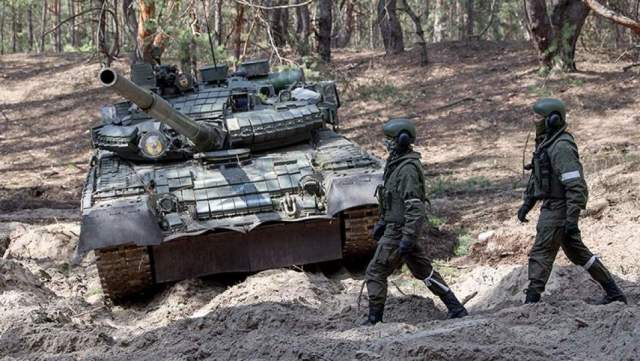
Servicemen and equipment of the People's Militia of the LPR near the city of Severodonetsk
Image Source: Photo: TASS/Gavriil Grigorov
In recent days, the armed formations of Ukraine have been saving ammunition and not spending shells on infantry.
— For them, tanks and equipment are a priority, — the fighters explain.
They don't shoot at the "bird" — it's almost impossible to see it in the sky. Nobody wants to break the morning silence unnecessarily.
On the front
The unit whose location was visited by Izvestia is fighting in the Severodonetsk direction. It stands in the forest where there were fires. After each step, a cloud of ash rises under your feet. Ukrainian anti—tank mines are lying in the lowlands - they were not even tried to disguise them.
— Hastily sketched? — we ask.
— Most likely, they are set for non—extraction, - the LNR officer accompanying us Igor answers. — There should be an anti-personnel mine under the anti-tank one. You move the anti-tank, and the anti-personnel one lying under it will explode.
About half a kilometer away we go out to a disguised UAZ-"loaf" and several fighters with it.
— This is an intermediate sanitary post, — Igor explains. — If there are wounded, the soldiers will have to drive as close as possible to the front line and pick them up. The patency of the car allows you to do this.
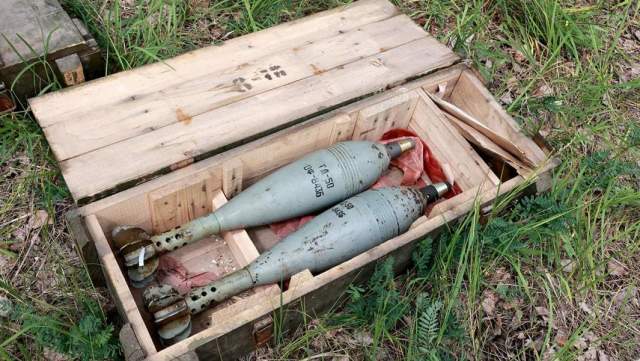
Photo: IZVESTIA/Pavel Volkov
Image source: iz.ru
The closer to the front line, the more craters, unexploded ordnance and fallen trees. The silence no longer seems soothing.
In the first trench, we are met by soldiers in full combat gear. In front of us is a clearing, and behind it are bushes where the AFU positions are located.
— It's a little more than a hundred meters to the enemy — it's better not to talk loudly here, — Igor instructs. — It's quiet now, but if it seems to him that there is a revival in our positions, he will immediately open fire.
I peer into the "green", but I don't see anything suspicious — pine trees and slightly swaying leaves of bushes in a light wind.
— Now theroborona is standing against us, — says Igor. — We know that such units are often reinforced by mercenaries — Polish and Georgian.
According to him, the help of NATO and even more distant countries is felt at the front.
"I saw British bulletproof vests in enemy trenches," he says.
Then he takes off his helmet and shows the tag on the back: "MG ACH HELMET. Zebra armour Ltd. Made in South Africa» .
—A Yuar helmet,— he explains. — I got it from a dead comrade. He touched it somewhere here, in the Severodonetsk direction.
Farthest dugout
Pine forests in the vicinity of Severodonetsk and Lisichansk stand on the sands. On the one hand, it's good — it's easy to dig, the soldiers admit. On the other hand, when it rains, the walls of the trenches crumble heavily, they have to be renewed and strengthened with wood.
— We have been fighting in these forests for about three months, — a fighter with the call sign Proud told Izvestia. — At first it was extremely restless here. Artillery,/// and mortars were constantly shelled. We couldn't even sleep because of the shelling, but everything is changing. Now the enemy is snapping, of course, but not so seriously.
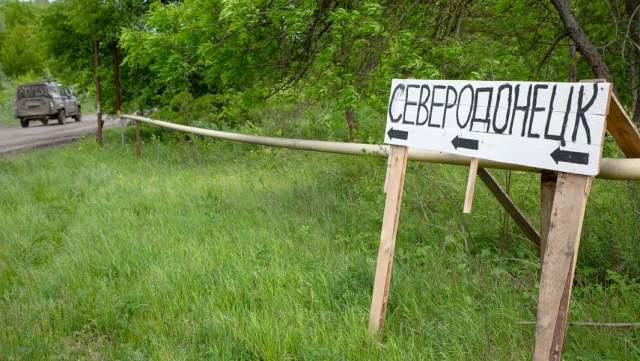
Photo: TASS/Alexander River
Image source: iz.ru
After the first battles, the LPR fighters told Izvestia, they stopped being lazy to dig in. Field fortifications have saved their lives more than once.
The guys talk about the "farcical" dugout. A heavy 122-millimeter shell landed in its very center, but did not penetrate the overlap.
— The dugout was equipped according to all the rules: in three rolls, and a layer of sand was laid on top, — said the LPR fighter Roman. — The shell scattered two standing logs, and the third survived. We weren't even swamped. However, they received light contusions — they lay for three days. Now everything is normal, we are on duty.
Trees in fragments
The LPR fighters say that their own land is fighting for them. Sand often saves lives. Heavy shells and even mortar shells go into it and explode there without causing harm. Only perfectly round holes from ammunition remain on the surface after arrival.
They pity the forest — it dies in vain. It can no longer be used on the farm.
"All the trees are in pieces," they lament. — You won't be able to cut down such a pine tree, you'll break the chainsaw.
During the fighting, they repeatedly extinguished forest fires. Ukrainian saboteurs tried several times to set fire to the forest with the help of artisanal devices.
— They take a metal cylinder filled with flammable substances, put it near the trunk of a tree and set it on fire, — the soldiers of the LPR say. — Such "lighters" burn well — the flame height is about a meter, and a pine tree in a dry forest can quickly catch fire.
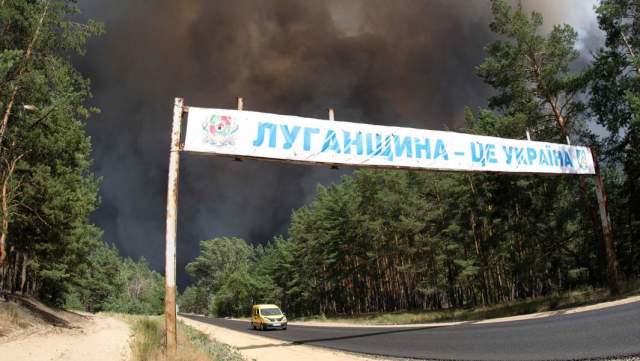
Smoke from a forest fire in the vicinity of the city of Severodonetsk
Image Source: Photo: TASS/Zuma
The fighters constantly monitor fire safety in their area of responsibility, so they always managed to put out such "lighters".
— The fights have taught us a lot, — says Igor. — We try not to act according to a template. We change the delivery time of hot food and ammunition all the time. We don't give the Ukrainian artillery a chance to cover us at these moments.
The LPR units are doing well with ammunition. The fighters do not complain about the work of the kitchen. There is always borscht, soup, porridge, salads, tea or coffee — it helps to maintain morale.
The best reviews are about the Russian tankers, with whom we had to act shoulder to shoulder.
— They suppressed firing points on our site, — the LPR fighters recall. — Well-coordinated, competent crews and good guys.
A Race with Death
The next stop is at the location of the LPR mortar unit. He is tasked with striking at the enemy's fortified area. To carry it out, two 120 mm mortars are pushed into the industrial zone.
— We will work on the firing points and equipment identified by the scouts, — says the officer with the call sign Almaz. — Severodonetsk and Lisichansk are attacking other units, and ours provides promotion.
The mortar men have seven minutes to do everything about everything — during this time they must make a target shot, after adjusting, release eight mines and leave the position. Otherwise, they may be hit back.
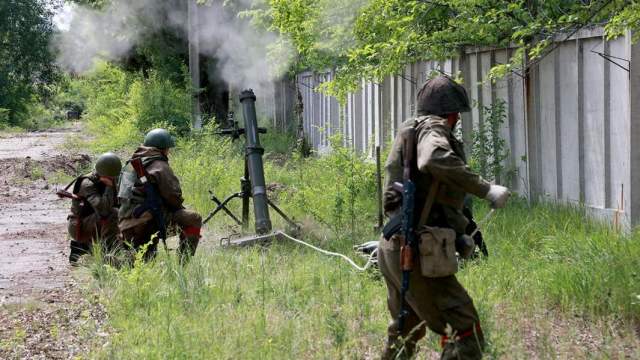
Photo: IZVESTIA/Pavel Volkov
Image source: iz.ru
Finally, the coordinates come, and the first mortar crew releases a targeting mine. After a few seconds, an explosion is heard somewhere in the distance, and a minute later corrections come from the spotter.
Minimetchiki change the sight and release eight mines. After that, the race with death begins. They have no more than five minutes. The crews quickly disassemble the mortars and throw heavy plates and barrels into the car body. It takes another minute or two.
The car starts to move, the soldiers jump into the back on the move.
— Hurry up! — they shout to the driver. But you won't be able to accelerate much on a broken road. Everyone listens attentively, but there is silence. Seven minutes are up, during which time the car drives off to a safe distance. The retaliatory strike never came.
— They have problems with ammunition, — the fighters conclude.
Peaceful professions
All units of the LPR are ready for a decisive assault on the Severodonetsk-Lisichansk agglomeration and the complete liberation of the territory of the LPR.
— In the near future we have to put the squeeze on the enemy and we want the fighting to end faster, — infantry officer Igor told us before parting. — We know that the enemy is hiding behind residents and leaves behind destroyed houses, schools and kindergartens. But we will definitely clear it all up and put it in order. Let's get back to peaceful life.
The fighters agree. They say that they have not yet forgotten their main peaceful professions. Former miners, teachers, lawyers, workers and auto mechanics serve in Igor's unit.
Bogdan Stepovoy
